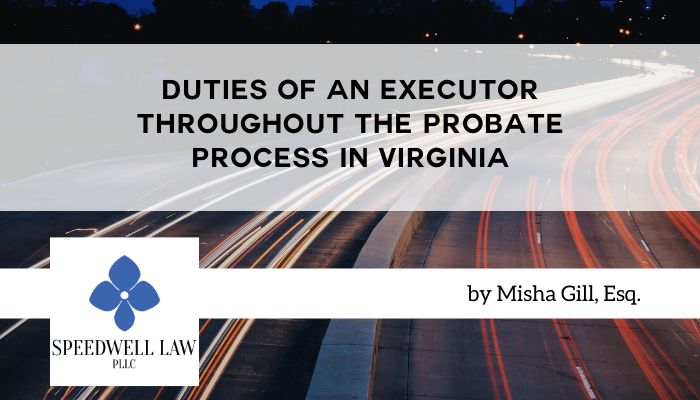
Duties Of An Executor Throughout the Probate Process in Virginia
If you are named as the executor of a friend or loved one’s estate, it means that someone has trusted you with administering their estate after they have passed away and carrying out their last wishes. So, it is without question an important responsibility.
But, being someone’s executor can also be daunting. Chances are you haven’t done this before, and knowing what will be required of you and where to start can be overwhelming.
However, with a better understanding of what is involved, right from the start, and where you can get help, you can feel more confident and save yourself a great deal of time and stress along the way.
Responsibilities of an Executor in Virginia
The duties of an executor in Virginia are all-encompassing. Fulfilling these duties can involve as many as 70 separate tasks, over an average of 18 months.
Simply stated, an executor’s responsibility is to execute the wishes of the deceased as per the terms set out in their written instructions, which are found in the Last Will and Testament of the deceased.
At a higher level, an executor’s fiduciary responsibility is to remain honest, to avoid any conflicts of interest, to communicate efficiently with the decedent’s heirs and beneficiaries, and to administer the assets and liabilities of the deceased’s estate as timely and as accurately as possible, in the same way that any intelligent and careful person would look after their own affairs.
At a more specific and detailed level, an executor’s responsibility involves performing the following duties:
- Locating and probating the Last Will and Testament of the deceased. If the deceased left a Will, this is the most important first step for an executor. Probate is the process by which a Virginia probate court acknowledges that the Will which has been provided is the last valid Will of the deceased, and confirms the identity and authority of the named executor.
- Making funeral and burial arrangements;
- Securing and protecting the assets of the deceased;
- Managing any immediate responsibilities, such as dependents of the deceased, business operations, pets, etc.;
- Obtaining copies of the death certificate to use when dealing with the banks, insurance companies, and other institutions where the deceased held accounts;
- Reviewing and collecting the assets of the estate and filing any related legal reports that are required;
- Reviewing and paying the liabilities of the estate, and ascertaining that all possible creditors have been identified;
- Completing all statutory responsibilities for the deceased, including filing the final tax returns, setting up any trusts, etc.;
- Keeping proper books of records and regularly communicating with the heirs and beneficiaries of the deceased; and
- Liquidating and distributing the assets of the estate.
Although many of these duties may seem fairly easy on the surface, each one of them involves a series of individual tasks that need to be performed.
Also, note that while the overall responsibility for the estate remains with the executor, he or she is allowed by Virginia law to hire other professionals, such as tax advisors, investment advisors, accountants, lawyers, and other professionals, to assist with completing his or her fiduciary duties.
For more details or for assistance with fulfilling your duties as the executor of a loved one or friend’s estate in Virginia, contact an experienced Virginia probate and estate planning attorney for a free consultation. Contact us at (703) 553-2577 or use the contact form on our website.
The information on this site is for general informational purposes only. The information presented in this site is not legal advice or a legal opinion. You should seek the advice of legal counsel of your choice before acting upon any of the information in this site.





